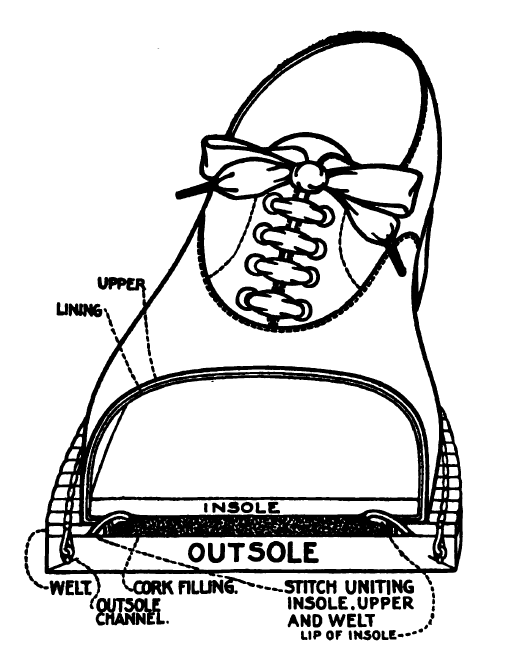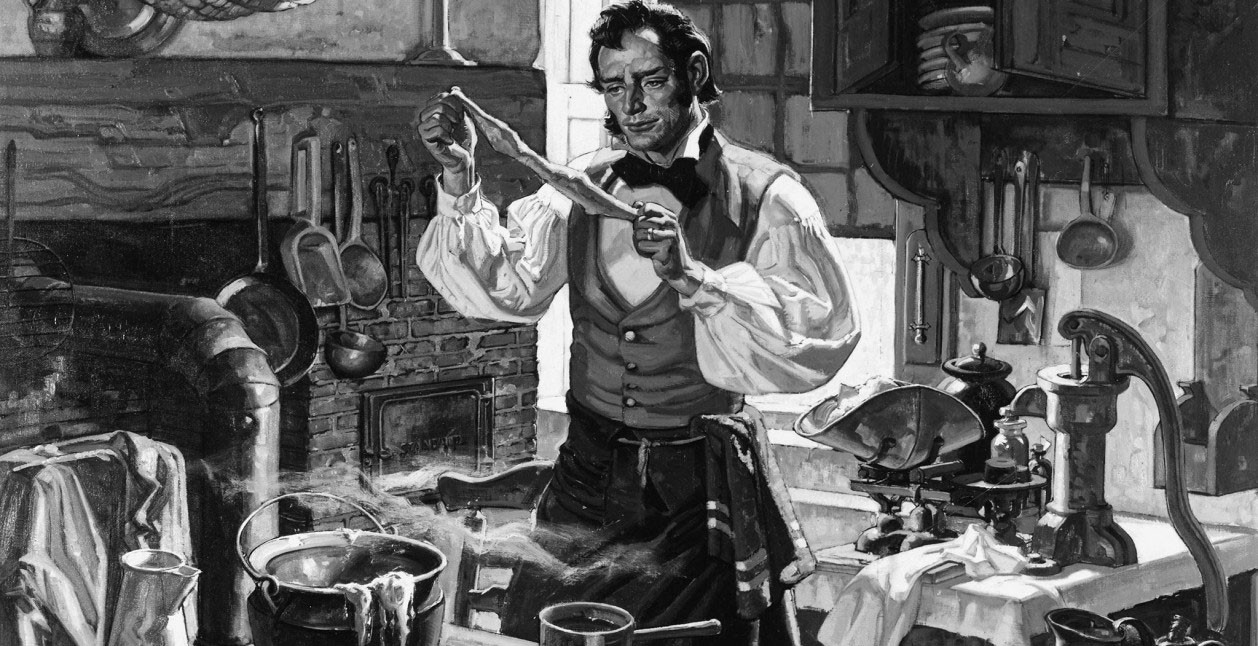By Maja Bayyoud
One of the first stories I wrote for Archibald was about our men’s dress shoes. I sat with colleagues and heard about how they’d come to the decision to make them and saw the genuine passion they had for the final product. They’d travelled far and wide to find the best shoe, spoken to experts, and examined what our competitors were doing. Finally and after months of research, they settled on a father and son team based in Modena who made the most incredible shoes they called ‘Goodyear a mano’. Goodyear welted, by hand. They explained that the shoes were finger stitched, that only very few of the big brands still made shoes in this way. So a pretty special shoe.
What’s a welt?
Simply put, The welt on a shoe isolates the outsole and the insole so the shoe can be resoled without damage to the upper of the shoe. This can either be done by hand or by a machine.

The accidental disovery
Three months after I wrote my story, we had a comment on one of our Facebook ads for the shoes that changed everything.
…an oxymoron for sure. Goodyear is a type of machine used to machine attach the welt, it is not an “a mano” (handmade) step or operation… that would be hand welting not goodyear welting..
That comment threw us. The natural, instinctive reaction was affront. How could someone suggest we didn’t know our stuff? After all, we’d heard it straight from our craftsman Alessandro: Goodyear, a mano. By hand. He had made the shoe, he certainly knew best, there was no point arguing it. Except, maybe something was lost in translation and we couldn’t be 100% certain that we knew exactly what we had on our hands. Basically, we had made three assumptions that led to some serious branding errors:
- That the two shoes we had held up as our gold standard, a Berluti pair and a John Lobb pair, had employed the same finger stitching process we were using.
- That a ‘Goodyear welt’ could be completed either by hand or by a machine of the same name, and that ‘Goodyear’ was simply a description of a method of welting, and not of how the method is executed.
- That other luxury brands had made (and branded) their shoes in the best way, and that they should be considered the gold standard.
All of those assumptions were wrong. We found that when it comes to the world of men’s dress shoes, very few brands (or their representatives) actually know what they’re talking about. Naturally, I had no clue about any of it- I had never purchased men’s dress shoes myself and didn’t have any connoisseurs of the craft in my phone contacts. We started by speaking to Alessandro, who continued to say we had a Goodyear shoe- welted by hand. He sent us a video demonstrating how he stitched the Guardolo (welt) on with a thick needle, and how this meant the shoe could be resoled without damaging the upper.
Our eureka moment came weeks later.
Goodyear by hand turned out to be an internet-wide misnomer, appearing on old established luxury brands websites (see Loake’s confusing as hell branding of their 1880 range), youtube explainers, blogs, and more. Brands took advantage of the confusion surrounding the welt, some even going so far as to make it seem equivalent in quality to a hand-welted shoe. My favourite was the Crocket and Jones explainer:
‘Charles Goodyear Jr. patented his Goodyear Welt sewing machine in 1871, a machine that could quickly stitch together the welt, upper, and soles, without the inefficient tedium of hand-sewing.’
Branding quality and craftsmanship as ‘inefficient tedium’ was certainly a novel approach. My internet-based research had only confused me even more, so I decided it was time to ring up some brands and hear it straight from the luxury purveyors themselves. I rang Churches, Berluti, John Lobb, and Loake and asked each the same question: Can you hand welt a goodyear shoe, and is a goodyear welted shoe of the same quality as a hand welted one? Each conversation left me more confused than the last, and each brand answered entirely differently. Berluti said the following in response via email:
‘Berluti shoes are mostly handmade by our ateliers, however to respond to a huge demand, a few small parts of the shoes are created with the help of a machine’
When I rang up John Lobb, I was told that the shoe was hand welted because the machine was operated by hand, which is entirely inaccurate and either a genuine mistake or misleading salesmanship.
Finally, I found my answers on a men’s style forum, where a group of dress shoe aficionados and craftsmen willingly and freely clarified the difference in no uncertain terms. You can’t have a goodyear welted shoe that’s hand welted. Turns out, it pays to read and engage with your Facebook comments. 
The golden nugget of truth
Charles Goodyear invented his machine to automate a process that had been happening for centuries to speed up the production of shoes. But welting had existed well before then, designed to ensure a shoe could be resoled without damage to the upper and developed over centuries of craftsmanship. We went back to Alessandro and found that our confusion had been the result of a language barrier- in Italy, a hand welt is commonly referred to as ‘Goodyear by hand’ simply because Goodyear welting has become so ubiquitous. It’s considered synonymous with the process of welting the outsole in a way the means you can resole a shoe easily without damaging the upper, when actually Goodyear welting is always machine made- it’s literally named after a machine, that’s named after a man that invented it.
So what makes hand welting better? Again, when I asked the same brands follow up questions about whether there was a difference in quality I was told there wasn’t one, and that hand welting was simply a method used in bespoke shoe-making to give the option of a customised product. The forums and Alessandro came to my rescue once more. In order to be able to hand welt a shoe, you need to use high quality materials like vegetable tanned leather of a certain thickness that can withstand channels being cut into it for the holdfast, where the stitches are driven through by hand.
What does this mean for our shoes?

The good news: what we have on our hands is pretty special, and rare. If you want a hand welted shoe from the big names, it’ll have to be through their bespoke service and will cost about £5,000. Some Italian brands do hand welt their shoes, like Enzo Bonafe- for a £700 price tag, and not easily available online. Ours cost half that.
The bad (but not really bad) news: we have a lot of work to do and a lot of content to update (include that not-so-subtle ‘Goodyear a mano’ stamp on our soles). Some products are easier to understand and value than others, and we didn’t expect how complicated and riddled with inconsistencies (some probably deliberate) the world of men’s dress shoes really was.
The conclusion
Transparency is a fashionable concept that many brands throw around without any actual substance to what they say. It’s largely self regulated and there are no checks and balances on what brands claim, what those claims means in practice, and how they can be proven. So it’s easy for them to say their shoes are handmade when customers come calling, because the process is deeply complicated and a ‘handmade’ shoe can mean everything and nothing.
We made a mistake because of a language barrier and the confusing breadth of resources that exist on the process, but ultimately we grew from it. We couldn’t have been more transparent about it from start to finish, from sharing our initial error and making unedited videos from our workshop public, to crowdsourcing opinions from those in the know. I’d like to shout out Daniel (last name redacted) from Facebook who commented on our initial ad and showed us our mistake in the first place, and the users of Style Forum for both their posts and confirming it was definitely hand welted. I could have lived my whole life not knowing what a welt is, or who the hell Charles Goodyear was. I’m kind of glad I do now.
